Empowering the Human Family
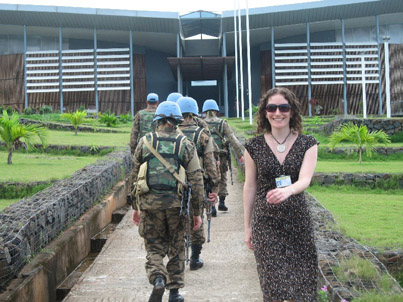
Law graduate Anna Matas worked at McGill's Special Court for Sierra Leone Legal Clinic last year. Now a legal liaison in Special Court for Sierra Leone in Freetown, she shares a walkway with Mongolian peacekeepers.
COURTESY OF Anna Matas
On Dec. 10, 1948, the United Nations General Assembly adopted the Universal Declaration of Human Rights, whose principal drafter was McGill Law Professor John Humphrey. Since that day, the international community has annually observed Human Rights Day, each year focusing on a particular rights related theme, this year's being the fight against poverty. The Reporter invites you to discover just some of the many initiatives being undertaken at McGill, and the people who are making sure the university does its part to promote and protect human rights and dignity throughout the world.
Law students without borders
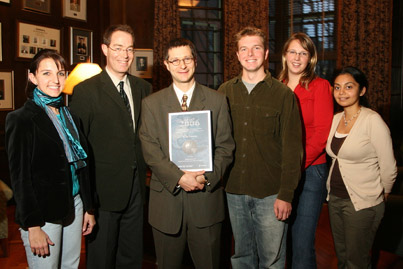
Law Dean Nicholas Kasirer and Centre for Human Rights and Legal Pluralism Director René Provost (holding the award) are joined by participants Melissa Casagrande, D.C.L student, Tam Boyar, BCL/LLB, Gaelle Missire, LL.M, and Parul Shah, BCL/LLB.
Owen Egan
René Provost, professor of law and director of McGill's Centre for Human Rights and Legal Pluralism (CHRLP), asks a rhetorical question with which students have always struggled: How can you gain experience without a job? The Centre, whose objective is "to advance innovative research on human rights and the role of law in a legally plural world," has an award-winning solution that helps advance the cause of human rights around the world.
The International Tribunals Program provides a way for them to get directly involved with the inner workings of real legal institutions in parts of the world where human rights issues have daily life and death consequences.
Part of the program is an innovative association between McGill and the Special Court for Sierra Leone (SCSL), which was established by the Government of Sierra Leone and the United Nations. The SCSL's mission is to bring to justice those who committed violations of international humanitarian law and Sierra Leonean law over a decade of bloody civil war that has left Sierra Leone with a crippling dearth of financial and human resources. Without those resources, managing and maintaining a legitimate, effective international tribunal is nearly impossible. That's where McGill students come in.
Since June, 2004, the Special Court for Sierra Leone Legal Clinic has put McGill law students at the disposal of the SCSL judges who are hearing the war crimes cases. This group of "remote" law clerks, working on closed-circuit website, receives questions from the judges and requests for research on specific topics then use the resources available at McGill to research the issue and draft a response, sometimes with as little as 24 hours to come back with an answer.
A second component of the program, its international judicial internships, was launched by the CHRLP in 2005. Law students are placed with legal bodies around the world working on human rights, international criminal law and international dispute resolution and arbitration, such as the International Court of justice and the International Criminal Tribunals for Rwanda and the former Yugoslavia.
McGill Law student Kirk Shannon worked for the International Criminal Tribunal for Rwanda, based in Arusha, Tanzania from May to August, 2006. "When you study from a case book in class, you learn about human rights and international law in broad strokes," said Shannon. "At the Arusha Triubunal, I got to see how it actually plays out in the tribunal context. It is the kind of experience you could never get in a classroom setting."
The program recently received an Award for Excellence in Internationalization, administered by the Scotiabank Group and the Association of Universities and Colleges in Canada, which recognizes academic programs for their innovation and their broader impact on internationalization.
By building bridges between McGill and the institutions that work to ensure the respect human dignity and human rights, McGill students can make a tangible difference in the global social justice landscape. In that way, said CHRLP Executive Director Nandini Ramanujam, we are better able "connect the ivory tower of research to real life."
For more information, visit www.mcgill.ca/humanrights.
Partners in peace
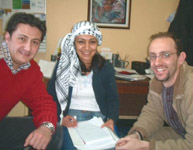
The McGill Middle East Program in Civil Society and Peace Building brings together fellows from Jordan, the Palestinian Territories and Israel.
COURTESY OF the McGill Middle East Program
The McGill Middle East Program in Civil Society and Peace Building is as improbable as its title. When Social Work Professor Jim Torczyner first tried to export his expertise in the field of rights-based community practice social work to what is arguably the world's most chronically querulous region, it seemed like an impossible dream. As it turned out, the program was the perfect fit in a part of the world where any notion of human rights tends to get lost amid the exigencies of daily conflict. "Divisions among groups render them powerless and what we do is organize across differences on common issues and it works."
That philosophy plays out on the ground every day in the program's five storefront practice centres in west Jerusalem and Beersheva, east Jerusalem and Nablus and Amman, Jordan, where graduates of the MMEP's one-year MSW fellowship program work with local disadvantaged populations to empower them to access their existing rights. "The idea," said Torczyner, "is to promote a regional culture based on the principle that all people share the same rights and we help create the conditions whereby they can access them."
The key to the MMEP's success is contact, both here and in the poorest neighbourhoods of the Middle East. "Social change is about relationships," said Torczyner. "It can only happen face to face." Those relationships are built by bringing together "people who've never even seen the other until they get here", and encouraging them to share their life stories, and how the regional conflict has affected them personally. Through their involvement with the program, fellows are better able "to understand how conflict shapes our lives, to understand and value the other person, and to understand and value the other person's perspective."
The fellows, of which there have been 40 since the program began, spend the first year of their fellowship studying at McGill and the second year working at one the centres. Once they have completed the fellowship, they are bound contractually to spend another four years working at the centres. This long-term commitment ensures that the fellows use their acquired knowledge to help create lasting conditions for peace. Most of the Directors of the centers are now former fellows.
The success of the program and the centers, which help over 75,000 low income individuals annually, has not gone unnoticed. The program has recently secured additional funding, which will allow four as many as four new practice centres to open their doors, and further expand its important mission of promoting social justice on a grassroots level in a region where the poorest citizens are war's walking victims.
For more information, visit www.mmep.mcgill.ca.
A better deal for the working poor
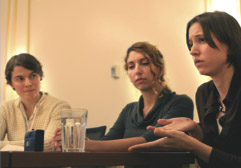
Anna Shea, Magda Barrera and Kate Penrose of the Institute for Health and Social Policy are committed to helping improve labor standards for the world's poorest citizens.
Owen Egan
Is it naïve to think that companies around the world motivated by profit could be convinced that it is in their interest to improve the conditions of their poorest workers? Those working at McGill's Institute for Health and Social Policy (IHSP) certainly don't think so, and they are setting out to prove to policymakers that good social conditions and good business can go hand in hand.
The Institute was founded in 2005 by its current director, Dr Jody Heymann, MD, PhD, creator of the Harvard-based Project on Global Working Families and one of America's foremost authorities on the impact of health and social policy on working families. Most recently, Heymann added Forgotten Families, a groundbreaking study on how globalization affects working families around the world, to her list of widely respected books on social policy.
The IHSP's mission is to conduct and support research on how certain social conditions impact the health and well being of individuals, families and populations around the world. The challenge is to translate those findings into policies and programs that help improve those social conditions. It is designed to be multi-disciplinary in nature and to cut across myriad faculties at McGill, such as Medicine, Arts, Education, Management and Law.
Given the theme of Human Rights Day 2006, it is fitting that poverty is receiving a lot of attention at the IHSP. Two initiatives in particular are set to provide insight into the working conditions of the world's poor.
The first involves the study of a Cambodia-United States trade agreement meant to explore links between improvements to working conditions and increased access to major markets. A key element of the agreement is the role of the International Labor Organization in monitoring working conditions in Cambodia's factories and formulating incentives, such as increased access to the U.S. market, for business and government to improve labor conditions.
To Heymann's research assistant, Anna Shea, this type of incentive has proven far more effective than sanctions. "What we learned is that relatively good labor standards tend to be an advantage when countries are competing for investment, which is really compelling for the institute because we want to show that improving lives of workers is not mutually exclusive from profit."
The working conditions of the poor will also be explored by the new Policy Fellowship Program. Each year over the next five will bring a new group of fellows who will tackle a different social issue with important health implications. As the name of the program suggests, the research and field work of the fellows (both in Canada and abroad) is intended to inform policy recommendations. While admitting that it may be difficult to get the ear of policymakers elsewhere and even at home, research assistant Magda Barrera said the goal of the project is to get the powers that be to listen and thus affect real change, by "taking big ideas in population health and developing them for policy." Research Project Administrator Kate Penrose agreed: "We will be able to say to policymakers: you're spending all this money on health care but here are the areas to focus on."
For more information on the Institute for Health and Social Policy, visit www.mcgill.ca/ihsp.
Demanding justice
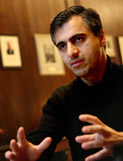
Dr Payam Akhavan believes the Zahra Kazemi affair represents a moment of truth in terms of Canada's genuine commitment to individual accountability and human rights.
Owen Egan
On June 23, 2003, Iranian-Canadian photojournalist Zahra Kazemi was arrested outside the notorious Evin prison in Tehran while taking pictures of a vigil held by family members of jailed student activists. Nineteen days later, she was dead. Now, a group of students and professors from McGill's Human Rights Working Group (HRGW) has launched a petition to demand both answers from the Iranian government and further action from their own.
Immediately following Kazemi's death, Iranian officials offered this explanation: It was a stroke suffered during her interrogation. Later revelations showed evidence of a brutal beating, rape and torture, all under the watch of one of Iran's most ruthless repressors of political dissidence, current Prosecutor General Saeed Mortazavi.
Far from being held accountable, Mortazavi was promoted by the Iranian government and remains one of its central figures. In June 2006, insult was added to injury when Mortazavi was part of the Iranian delegation to the inaugural session of the newly formed United Nations Human Rights Council in Geneva — a clear sign that the Iranian government believes that, on issues of human rights, it is untouchable.
Payam Akhavan is the former legal adviser to the Chief Prosecutor at The Hague and the first war crimes prosecutor at the International Criminal Tribunal for the Former Yugoslavia. Now a law professor at McGill, he was instrumental in pressuring the Harper government to call for Mortazavi's arrest during the Geneva session. While ultimately unsuccessful, the government's position sent shockwaves throughout Iran because for the first time it demonstrated that Mortazavi is not in fact untouchable. Now, the struggle is to convince the Canadian government to follow through on its promises.
Akhavan explained that, "We have to understand that human rights and accountability are not just about naïve idealism, but are at the core of global governance. The message that international law sends is that when you commit the crime of torture, you are a criminal. You are no longer a head of state, you are no longer a minister, you are no longer a prosecutor general, it is no longer about diplomacy."
The HRWG feels that while the government's call for Mortazavi's arrest was an important first step, it will amount to little if no further action takes place. For law student and HRWG member Lee Rovinescu, the goal of the petition is to pressure the Canadian government to launch a formal investigation. He fears that the government "is merely paying lip service rather than having a plan of action to pursue a follow up its statements and promises."
An investigation could lead to an indictment, an extradition request and possibly to international arrest warrants — all important arrows in the quiver of those who want to see Saeed Mortazavi brought to justice and Zahra Kazemi avenged. Akhavan asks in no uncertain terms: "If Canada is going to allow a Canadian citizen to be tortured and murdered with impunity, what credibility does it have in the international front in promoting human rights and international justice?"
For more information and to sign the petition, please visit www.kazemijustice.ca.

